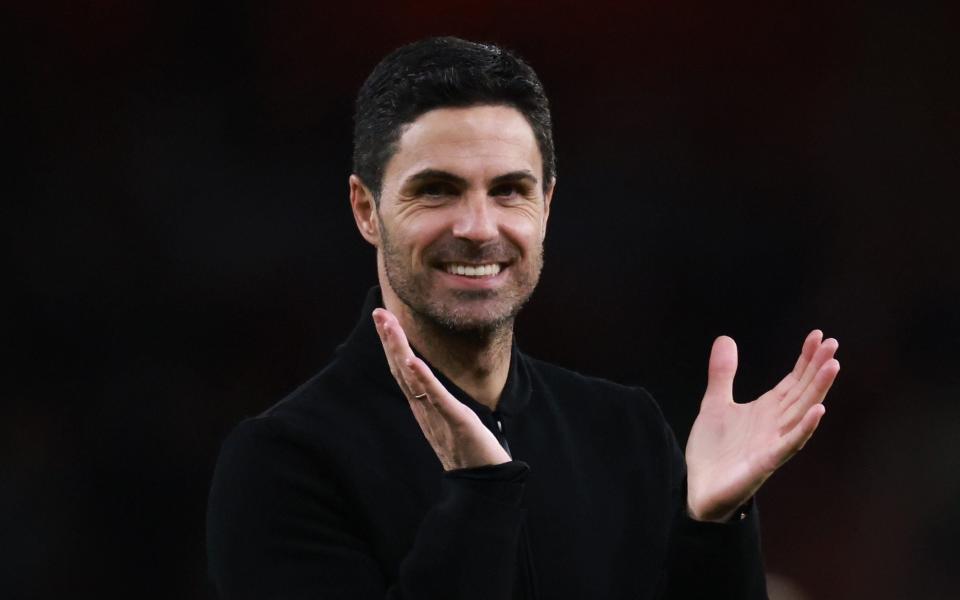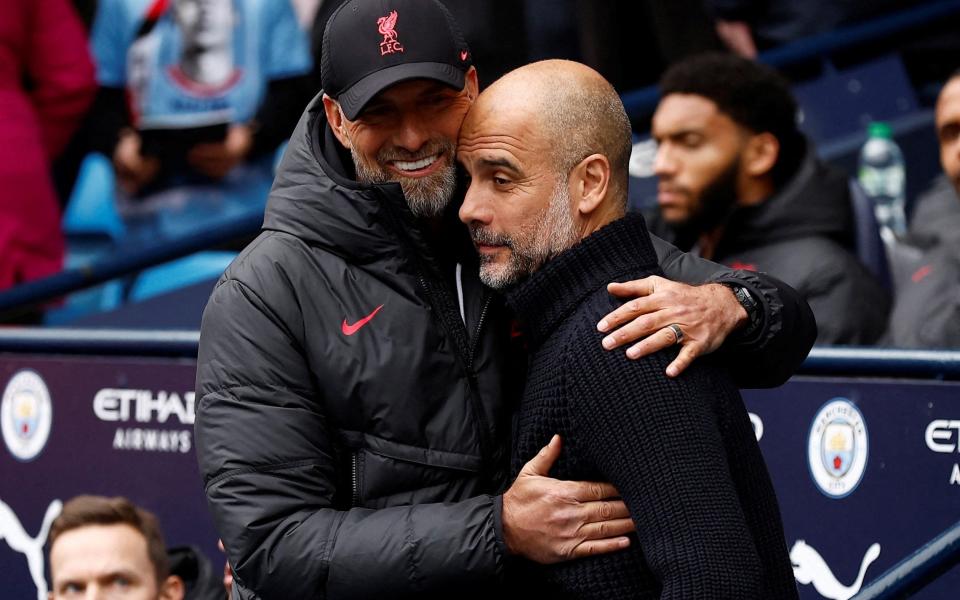Arsenal have the chance to grab greater power than just a Premier League title

First the North London derby, and then, on Monday, another meeting that could either go some way towards shaping the world to Arsenal’s benefit or indeed the other direction, which is the kind of major fork in the road to which the club has grown accustomed in the last two decades.
A second potential Premier League title in two seasons is in danger of slipping away by the finest of margins – not much more than one bad half at home against Aston Villa. No team has scored more goals than Mikel Arteta’s Arsenal, and none have conceded fewer. The squad is the second youngest in the Premier League and while change – and no little decay – afflicts rivals, a club that had been in some turbulence for most of the 2010s feels stable for now.
But no Premier League crown to go alongside the last won 20 years ago by Arsene Wenger. Should Tottenham Hotspur deal another blow to their old rival’s hopes of a 14th league title, then perhaps with three games to go, it will be over. The following day, Arsenal’s representatives at the Premier League shareholders’ meeting will join a crucial debate on the financial controls that will govern the Premier League for the next generation.
The club has a billionaire owner, in the Kroenke family, albeit not the kind of billionaire that David Dein, its erstwhile boardroom power, once sought to turbo-charge the club. Arsenal have no multi-club structure beyond Major League Soccer’s Colorado Rapids, all but redundant when it comes to the purposes for which others have acquired partner clubs across Europe and South America. Arsenal want the tight regulation that rewards self-sustaining clubs – the new squad cost rules and anchoring principles that are up for debate on Monday.
‘Big moment has not yet passed’
The club has found itself on the wrong side of history so often in 21st century football – building a new stadium just as the oligarch and fossil fuel fortunes transformed the economics of the game in the 2000s. This time it needs the pieces to fall in its favour – in support of one of English football’s heritage clubs, with a prudent approach to squad building but also an imperative to get back to winning Premier League titles again.
Is 2023-2024 this Arsenal’s last chance of a Premier League title? In these pages, Jamie Carragher has warned that Arteta and his players cannot afford to let opportunity drift past, as Mauricio Pochettino’s Spurs once did. Indeed, Premier League clubs will renew again this summer although financial controls – the profit and sustainability rules [PSR] – are already biting. The mood, as January showed, is much more cautious.
Other factors too: Liverpool will have a new manager next season, and major decisions to be made on three of their biggest players entering the last 12 months of contracts. Manchester United may have a new manager too, and PSR issues. That will at the very least be a concern for Chelsea. There is still the monolith of Manchester City to get past – although next season is the last on Pep Guardiola’s contract and also potentially that of sporting director Txiki Begiristain. City also have the small matter of some unresolved business with the Premier League’s governance department.

All of which says, the big moment has surely not yet passed for Arsenal with a young squad on an upward curve and a young manager. But for that to be sustainable in the long-term, the future will have to be more suited to the way the Kroenkes – and indeed Spurs – run their clubs. Arsenal are now led in that regard by executive vice-chairman Tim Lewis, a former mergers and acquisitions partner at Clifford Chance who has been hitherto unafraid to take on the fight for greater financial controls. Arsenal’s lesson of the last 20 years is surely that if the governance landscape is shaped by others then it can indeed become very harsh, very quickly.
The club’s most recent financial results for the year ending May 31 reported a £52 million loss, of which £19 million was the writing down of the value of the transfer misadventures of the previous decade, among them Nicolas Pepe. Arsenal have taken no risks on PSR compliancy. Last summer’s loan of David Raya, rather than a permanent deal immediately, demonstrated that margins are necessarily fine, as with the quiet January window this year.
Over 18 years of the Emirates Stadium, Arsenal have been powered in part from their commercial deals by the Dubai airline that has its name over the door. When it comes to commercial deals no battle could be more important for the club than the one currently being fought by the Premier League over the associated party transaction [APT] rules. These are to be challenged in court by one of the league’s members, as yet not officially named although there is no doubt among the other 19 who it is. Without serious APT rules there can be no serious financial controls.
‘We will try to keep developing’
The squad is strong: that £100 million spent on Declan Rice has never looked anything other than great value. Martin Odegaard, Bukayo Saka, and Ben White are all on long deals “We know it’s a very young team with a very bright future and still a lot of room for improvement,” Arteta said. “We will try to keep developing it.” It is far from complete, with the obvious deficit of a goalscorer a difficult problem to solve with PSR so tight. But the core of the squad is much earlier in the cycle than those at rivals.
The simmering unrest among the fanbase has dissipated in recent years, even through a recent season ticket rise – although the Kroenkes will know not to take that for granted. Much of those difficult questions will fall at the feet of Richard Garlick, a former Premier League executive, who moves up from director of football operations to become managing director in the summer.
The club estimates the value of the squad at £1 billion which would not be enough to build the Emirates these days. In terms of multi-purpose facility, the stadium is now certainly behind Spurs’ new home, the refitted Bernabeu or the Etihad and its new partner arena Co-op Live. When the club first alighted on Ashburton Grove in 1999, the cost of a new stadium was initially estimated at almost exactly what it would, 24 years on, cost to buy Rice last summer. By the end it was close to £400 million but that was still a significant burden for the late Wenger years.
Yet leaving Highbury was the only sensible option, even if the advantages it was intended to confer were never felt as emphatically as was hoped they would be at the end of the 1990s. Chelsea’s Stamford Bridge predicament underlines the risk of deferring stadium decisions. It was not a bad strategy Arsenal pursued in those years, it was simply that unforeseen events undermined it. Now Arsenal find themselves once again with a team challenging at the top again, and potentially for some time to come.
The lessons of history tell Arsenal they must do their best to shape the future of the English and European game – just controlling their own club is not enough.

